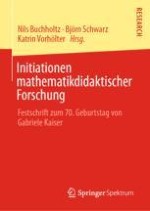2022 | OriginalPaper | Buchkapitel
16. The Relationship between Secondary School Mathematics Teachers’ Professional Competence and Instructional Quality: Empirical Findings from A Pilot Study in China
verfasst von : Xinrong Yang, Frederick Leung
Erschienen in: Initiationen mathematikdidaktischer Forschung
Verlag: Springer Fachmedien Wiesbaden
Aktivieren Sie unsere intelligente Suche, um passende Fachinhalte oder Patente zu finden.
Wählen Sie Textabschnitte aus um mit Künstlicher Intelligenz passenden Patente zu finden. powered by
Markieren Sie Textabschnitte, um KI-gestützt weitere passende Inhalte zu finden. powered by
